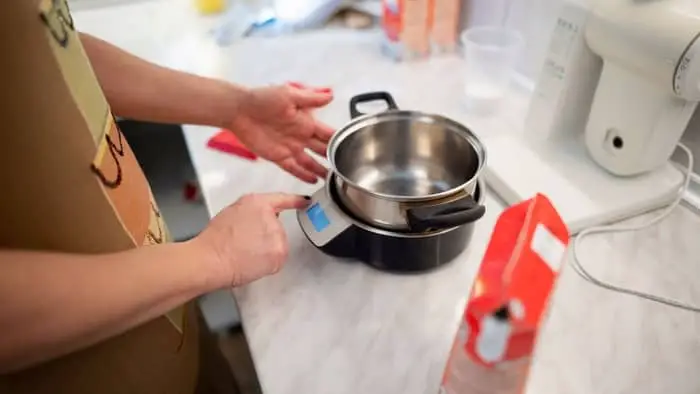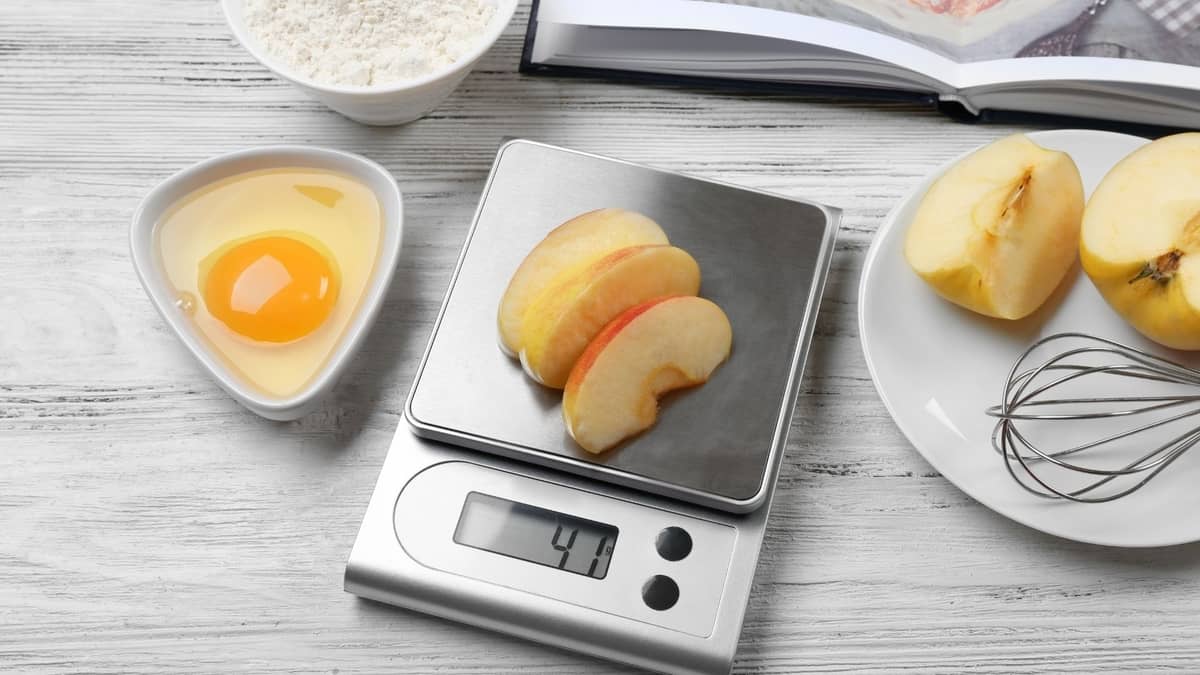Last Updated on December 30, 2022
Digital kitchen scales are a great way to accurately weigh out your ingredients. However, you may notice that your digital scale keeps changing weight when you are trying to measure out your ingredients. This can be problematic as it can cause you to add too much or too few ingredients to your recipe.
There are a few factors that can cause your scale to be reading inaccurately. Fortunately, by addressing these issues you can make sure your kitchen scale will measure your ingredients correctly. This will give you the best results in your recipes when baking.
Benefits of using a kitchen scale
With a properly working kitchen scale, you can use it to measure out your ingredients when baking. In fact, using a kitchen scale is generally the best way to measure out your ingredients, as it is more accurate than using measuring cups.
When using a kitchen scale, you can measure out the ingredients in ounces, grams, milliliters, and pounds. This allows you to easily measure out both wet and dry ingredients while you are baking. It gives you the exact measurement, unlike measuring cups which can be inaccurate.
Why Digital Scale Keeps Changing Weight
Many professional and home bakers have digital kitchen scales that they use while baking. Though most of the time they are easy to use and the most accurate, sometimes they malfunction. When the scales malfunction, you may notice that the weight keeps changing, even when you aren’t adding anything.
When your digital scale keeps changing weight, there are a few issues that can cause this to happen. After you figure out what may be causing this issue, you can fix the problem so your scale can work correctly.
Low battery
One of the most common causes of scales fluctuating weight is low battery. When a scale’s battery begins to run low, it can begin to work inaccurately and fluctuate as it does not have enough power to work right. When this begins to happen, it may be time for you to change out the batteries.
Uneven surface
When using your scale, be sure you only use it on a flat, even surface that is hard. If you try to use the scale on an even surface or a soft surface, such as a carpet, it will not work properly. To prevent this from happening, only use your kitchen scale on smooth, hard surfaces, and do not place it in the cracks of tiles.
Residue and grime build-up
Over time, residue and grime can build up on your scale. This can happen from food and grease in your kitchen that comes in contact with your scale when baking.
This grime and residue can build up, leaving to your scale give inaccurate readings. Be sure to regularly clean your scale to prevent build-up from grease and food from happening.
Nice well Food Scale, 22lb Digital Kitchen Scale
Water damage
Kitchen scales aren’t waterproof, so if water and moisture get in, they can cause damage. In some cases, the scale may not work at all, whereas at other times it may just cause inaccuracies while weighing your ingredients. If you ever spill any liquid on your scale, be sure to clean it up right away and make sure it is properly dried.
It isn’t properly calibrated
Sometimes, scales can become un-calibrated over time, causing them to not work correctly. You may need to regularly calibrate your scale so it can run properly.
Overloaded
Kitchen scales do have weight limits. If you add too much weight to your scale, it may cause it to overload and then lead to inaccuracies when weighing. Be sure to read the weight limit of your scale so you know what the limit is and try to avoid weighing things that are too heavy.
You moved it while using
Avoid moving your scale when you are in the process of measuring out your ingredients. Kitchen scales can be sensitive and moving them can mess up the reading of the ingredient you are adding.

It needs to be restarted
Like other technology, sometimes your scale simply needs to be restarted. In some cases, all you need to do is turn your scale off and then turn it back on again for it to work right.
Which Weighing Scale is the Most Accurate Digital or Analog?
When it comes to kitchen scales, you can get digital or analog options. While both options can work great, many people find that digital scales can be more accurate and the overall better choice. However, some people do prefer analog, with some even believing that analog is the better of the two choices.
Using kitchen scales is recommended over using measuring cups. By measuring with a scale, you can measure out the account amount of the ingredient that you need. When using measuring cups there is more room for error, as you can accidentally overmeasure the ingredient, especially flour, if you are not careful.
If you accidentally add too much or too little of an ingredient, this can have a major effect on your baked goods. While in some cases it may make no difference at all or only a minor difference, in some cases it can make a big difference in the flavor or texture of your cake.
Pros and Cons of Digital Scales
Analog scales are ideal because they are easy to read and give you accurate readings. You can also easily transition between different measurements such as grams, ounces, and milliliters.
Since digital scales come with the ability to tare, you can easily measure different ingredients in bowls. They offer more precise measurements, giving you the exact weight of what you are weighing. However, digital scales can get quite expensive and they will likely need to be recalibrated from time to time.
Pros and Cons of Analog Scales
One of the biggest pros of analog scales is they tend to be the cheaper option over digital scales. However, they typically only have numbers in increments of five, so it is harder to get a more precise reading. In addition, depending on the scale, the numbers can be hard to read.
Unlike analog scales, you don’t have to worry about buying batteries, which is another added expense. Analog scales also tend to be harder than digital scales as well.
Are Glass Digital Scales Accurate?
Yes, glass digital scales are accurate and easy to use. They can be a great option to have on hand for all of your baking needs.
Glass digital scales can get expensive but they are worth the investment if you are an avid baker. They will pay off as you will be able to get more accurate measurements, which allows you to get more precise and delicious bakes, allowing you to increase your baking skills.
One thing about glass scales is that you have to be careful as they are breakable. Be sure to store it somewhere safe so it does not get damaged. In addition, it is a good idea to wipe it clean after every use.
You may need to recalibrate your glass kitchen scale from time to time to ensure accurate readings. Most digital scales come with batteries however some of them you will need to buy the batteries separately.
Making Sure Your Kitchen Scale Is In Proper Working Order
Digital kitchen scales are a great tool to have in your kitchen to ensure to measure your ingredients while baking. However, your scale will need upkeep to allow it to work accurately. Be sure to use it only according to the instruction manually and change the battery as soon as it gets low.
Do you have any questions regarding why your digital scale keeps changing weight? If so, please ask any questions in the comment section below regarding using your kitchen scale.
FAQs
Why Does My Digital Scale Fluctuate?
There are many reasons that can cause your scale to fluctuate. Some of the most common reasons include low battery, using it on an uneven surface, overloading, grim build up, moving while using and water damage. In some cases, all you need to do is recalibrate your scale or turn it on and off again.
Can Digital Scales Give Wrong Readings?
Though digital scales are almost always accurate, they can give wrong readings. Be sure to regularly change the battery, use it only on a flat surface, keep it dry, don't move it and regularly clean it.
What Causes a Scale to Drift?
Drifting on a scale is when the weight reading does not stay on one number. This can happen when electronic malfunction within the digital indicator occurs or when low humidity causes static buildup.
How Do I Calibrate a Digital Scale?
To calibrate your scale, hold down on the on/off button until it comes up with 0.0. Then hold the mode button until it comes up with CAL for calibration.
Then, your scale will come with its required calibration weight. You can use nickels, which weigh five grams each to achieve that weight. The scale will then read pass when it has the calibration weight on it.

Ever since she was a young girl, Anna has been a lover of desserts. As an adult, she enjoys
baking a variety of desserts from cakes, cookies, brownies, bread, and more from scratch. She
enjoys sharing her passion for baking with others who also have a sweet tooth. From properly
measuring ingredients to making sure they are the correct temperature, Anna knows the
importance small details can make in baking. She wants to share her experience with others in
hopes they can make the most delicious baked goods. When she’s not busy blogging, Anna
enjoys trying new recipes in the kitchen.


